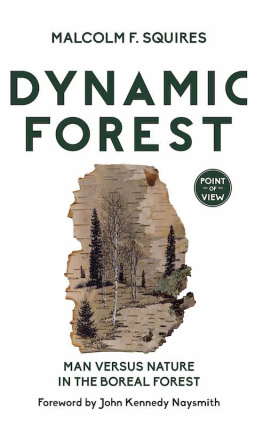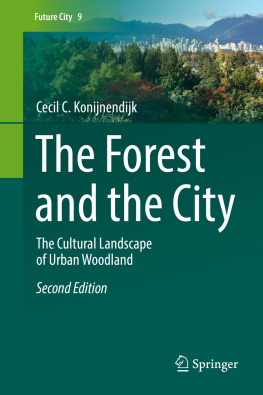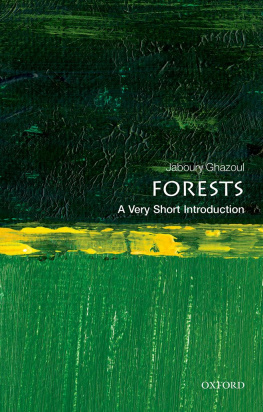POLITICS OF FORESTS
Series Editor: Sam Ock Park, Seoul National University, Korea
The IGU Commission on The Dynamics of Economic Space aims to play a leading international role in the development, promulgation and dissemination of new ideas in economic geography. It has as its goal the development of a strong analytical perspective on the processes, problems and policies associated with the dynamics of economic spaces as they are incorporated into the globalizing world economy. In recognition of the production alone to include business services, the broader service economy including e-business, enterprise and the creation of social capital, the changing world of work and intensifying economic interconnectedness. To achieve its aims, the Commission seeks to:
1) promote international discussion and debate on processes shaping economic spaces in developed, developing and transition economies.
2) encourage and facilitate debate on the theoretical underpinnings of economic geography.
3) analyse and evaluate frameworks of policies and patterns of governance that can be employed to mould and enhance economic spaces.
4) promote international dialogue and collaboration in research on economic spaces in developed, developing and transition economies.
5) collaborate with other IGU Commissions to realize the synergies of research collaboration between sub-disciplines in Geography to promote a richer and fuller understanding of the globalizing world.
To realize these five goals, the Commission proposes six themes to be addressed in the next four years in residential conferences and in joint meetings with other IGU Commissions:
Theme 1 : Territorial competition and collaboration in regional economic development
Theme 2: Industry in a networked world: making sense of globalization
Theme 3: The new economic geography: under-socialized economism versus over-socialized institutionalizm
Theme 4: Local growth and the service economy
Theme 5: E-commerce, E-business and the dynamics of economic development
Theme 6: Corporate strategies and the physical environment
First published 2004 by Ashgate Publishing
Published 2016 by Routledge
2 Park Square, Milton Park, Abingdon, Oxon OX14 4RN
711 Third Avenue, New York, NY 10017, USA
Routledge is an imprint of the Taylor & Francis Group, an informa business
Copyright 2004 Ari Aukusti Lehtinen, Jakob Dormer-Amnell and Bjrnar Sther
Ari Aukusti Lehtinen, Jakob Dormer-Amnell and Bjrnar Sther have asserted their right under the Copyright, Designs and Patents Act, 1988, to be identified as the editors of this work.
All rights reserved. No part of this book may be reprinted or reproduced or utilised in anyform or by any electronic, mechanical, or other means, now known or hereafter invented,including photocopying and recording, or in any information storage or retrieval system,without permission in writing from the publishers.
Notice:
Product or corporate names may be trademarks or registered trademarks, and are used onlyfor identification and explanation without intent to infringe.
British Library Cataloguing in Publication Data
Politics of forests : northern forest-industrial regimes in
the age of globalization. - (The dynamics of economic
space)
1. Forests and forestry - Economic aspects - Northern
Hemisphere 2. Forests and forestry - Government policy -
Northern Hemisphere 3. Lumber trade - Northern Hemisphere
I. Lehtinen, Ari Aukusti II. Dormer-Amnell, Jakob III. Sther,
Bjrnar
333.751509123
Library of Congress Cataloging-in-Publication Data
Politics of forests : northern forest-industrial regimes in the age of globalization /
edited by Ari Aukusti Lehtinen, Jakob Donner-Amnell, Bjrnar Sther.
p. cm. - (The dynamics of economic space)
Includes index.
ISBN0-7546-4197-X
1. Forests and forestry-Political aspects-Northern Hemisphere. 2. Forest
management-Northern Hemisphere. I. Lehtinen, Ari Aukusti. II. Donner-Amnell, Jakob.
III. Sther, Bjrnar. IV. Series.
SD246P662004
634.92091813--dc22
2004002427
ISBN 9780754641971 (hbk)
Transfered to Digital Printing in 2014
CONTENTS
PART I
CIRCUITS OF WOOD AND POWER: TIMBER FRONTIERS AND PAPER LANDSCAPES OF THE NORTH
Ari Aukusti Lektinen, Jakob Donner-Amnell and Bjrnar Sther
PART II
CANADA: FREEING FROM THE COLONIAL HERITAGE?
Roger Hayter
L. Anders Sandberg, Nicolas Houde and Patrick Lavoie
PART III
RUSSIAN FOREST INDUSTRY: ERODING THE PATRIMONIAL HEGEMONY
Ari Aukusti Lektinen
Jarmo Kortelainen
Juha Kotilainen
Maria Tysiachniouk and Jonathan Reisman
PART IV
NORDIC FOREST REGIMES: SUCCESS AND ITS PRICE
Jakob Donner-Amnell
Christer Peterson
Bjrnar Sther
PART V
CONCLUSIONS
Jakob Donner-Amnell, Ari Aukusti Lehtinen and Bjrnar Sther
Jakob Donner-Amnell, Research Fellow, Department of Social Policy, University of Joensuu, Finland
Roger Hayter, Professor, Department of Geography, Simon Fraser University, Burnaby, Canada
Nicolas Houde, Researcher, Department of Geography, Universit du Qubec, Montral, Canada
Jarmo Kortelainen, Senior Assistant Professor, Department of Geography, University of Joensuu, Finland
Juha Kotilainen, Research Fellow, Karelian Institute, Joensuu, Finland
Patrick Lavoie, Consultant, Forintek Canada Corporation
Ari Aukusti Lehtinen, Professor, Department of Geography, University of Joensuu, Finland
Christer Peterson, Professor, Division of Wood Technology, Lule University of Technology, Skellefte, Sweden
Jonathan Reisman, Assistant Researcher, Center for Independent Social Research, St. Petersburg, Russia
L. Anders Sandberg, Professor, Faculty of Environmental Studies, York University, Toronto, Canada
Bjrnar Sther, Associate Professor, Department of Sociology and Human Geography, University of Oslo, Norway
Maria Tysiachniouk, Head of Department, Department of Environmental Sociology, Center for Independent Social Research, St. Petersburg, Russia
Politics of Forests has been an exciting and intense process of co-authoring, literally shaped by the politics of forests transforming, and being transformed by, the conifer-dominated North. The work has been inspired and challenged by the riches of areal socioenvironmental variations, region-specific development features, distinct industrial and economic histories as well as divergences and convergences in institutional and academic traditions. Within the belt of conifer northwoods, the causes and results of politicoeconomic reorganizations in the forest industry emerge in full colour whenever we cross borders, both geographical and societal but also symbolic. The overcoming of borders between countries and cultures and the interfacing of local and global economic clusters are in focus in this volume, as is the crossing of the geopolitical constructions dividing the continents (including their maritime and inland modifications), seas and vegetation zones into regional jurisdictions or regimes. This approach also identifies the practical coexistence of economic and cultural as well as societal and ecological factors in the current transformation in the northern communities and companies. The view also guides us to focus on the layered presence of the conifer North within the global North.








